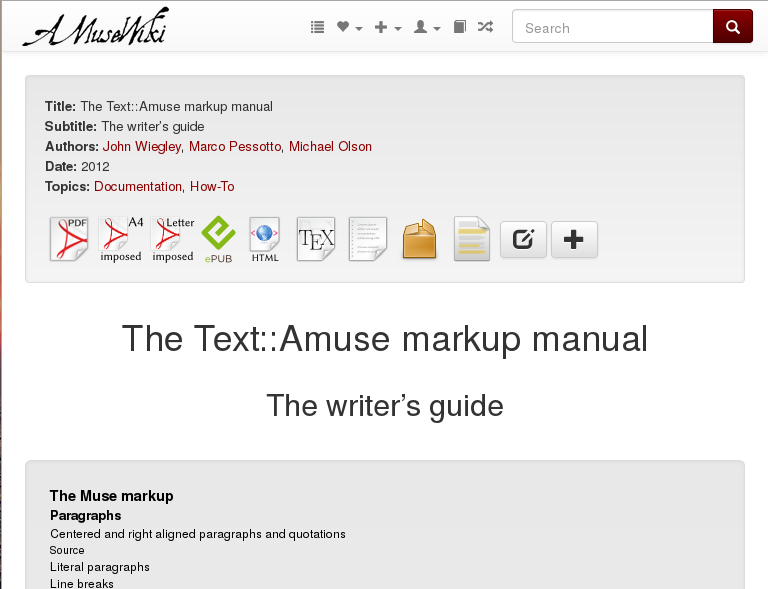Marco Pessotto (melmothX)
AmuseWiki: a library oriented wiki engine (talk)
How does it look like?

Scenario
-
Digital library with more than 2000 texts, including full-length books
-
Long term archiving (not fire and forget texts), control revision
-
Quality output required (read: LaTeX output)
-
Imposing of PDF for home-printing
-
EPUB output for mobile devices
-
Preference for a flat file storage (like ikiwiki or MoinMoin)
-
Creation of collections (like on mediawiki)
-
One-man project
The lightweight markup
-
No standard, even if Markdown seems to be the winner (but with dialects)
-
Emacs Muse: project kind of dead, but the markup is compact and expressive, documented, and has a reference implementation. https://www.gnu.org/software/emacs-muse/
-
Some incompatibilities have been introduced, but they are documented (to address corner cases where the syntax can be confusing).
-
Bottom line: all these markups are easy to use and it takes 5 minutes to learn one of them, as long as it is documented.
Our own dialect of Emacs Muse
-
Module:
Text::Amuse(produces LaTeX and HTML) -
Ill-suited for technical papers, though. No math support, no syntax highlight, but well-suited for general prose and even poetry.
-
It has every feature one could expect from a lightweight markup: images, sectioning, footnotes, simple tables, bold, italics, subscript, superscript, lists, verbatim, quotations.
-
So far proved itself good and expressive.
Importing
-
Legacy library had the texts in filtered HTML
-
People usually have the texts in Word format or copy and paste from HTML pages
-
The javascript HTML editor
CKEditorhas a “paste from Word” feature http://ckeditor.com/ -
Need to convert the HTML to Muse, preserving as much as possible the logical structure of the document (and discarding the noise).
-
Need some common search-and-replace patterns (like typographical quotes, text cleaning).
Compiling
-
Templating for output:
Template::Tiny -
PDF generation:
XeTeXorLuaTeX(Unicode aware, system fonts) -
EBook::EPUB::Lite(this is a port ofEBook::EPUBwithou XS dependencies) usingText::Amuse’s splat HTML output -
PDF::Imposition(written for this project but it’s a general purpose module): put logical pages into a physical page according to a schema (for booklets and home printing) -
All the above glued together by
Text::Amuse::Compile -
muse-compile.plscript is shipped withText::Amuse::Compile, so you can generate the formats from the command line.
Data storage
-
Texts themselves are self-contained. All the information describing the text (like author, title, categories) is stored in the header of the text. 1 text (even a whole book), 1 file.
-
Texts are stored in a Git archive
-
Git integration on the site with
cgit: http://www.amusewiki.org/git/amw/ -
Full text search: Xapian (light, fast, fairly simple to setup, well integrated in Perl with
Search::Xapian). -
Database integration:
DBIx::Class
Web backend
-
A daemon takes care of all the operations which are slow or somehow delicate where concurrent access could be a problem (text compilation, publication, indexing, Git interaction).
-
Formats are pregenerated, including the HTML. The frontend just serves them.
-
The backend and the frontend communicate via a job queue in the database.
-
Some message queue systems were examined, but resorted to use the database because it was the most straightforward and other solutions looked like over-engineering.
Web Frontend
-
Catalyst application: chaining, method-to-uri mapping, actively developed, great community, back-compatibility approach.
-
Plack-able application (currently deployed via nginx + FCGI)
-
Template: Template Toolkit
-
Localization via
Catalyst::Plugin::I18N(plus local overriding via local JSON file). -
Localized for English, Italian, Croatian, Macedonian, Russian, Finnish, Swedish, German, Spanish.
-
Multisite: on one instance you can run as many sites as you want (this was the most compelling argument to write AmuseWiki).
User management
-
Kept at minimum reusing existing solutions.
-
No hierarchical structure: each librarian can create other peer librarians (plus root for site management) with the same level of privileges.
-
Modes:
-
private site
-
blog site (only logged-in can edit)
-
moderated wiki (approval required)
-
open wiki (undertested)
-
The Bookbuilder
The basic idea is like the Wikimedia’s book creator, but with goodies. Features:
-
LaTeX output
-
Font selection
-
Paper size selection
-
Imposition schema selection
-
Cover images upload
-
Custom files are compiled by the backend, even if the users sees the live logs and the process is pretty fast.
-
EPUB output if required, with embedded fonts.
-
A basic question to keep robots away (probably will not scale, but so far works well)
Some time left?
If we have some more time and no questions...
The past
-
Drupal + filtered HTML, texts kept in sync on a local Git repo with scripts. Obviously it wasn’t a brilliant idea, to be generous.
-
Same filtered HTML inherited from Drupal, plus home-brewed CGI scripts. It kind of worked.
-
Dancer application and Emacs Muse markup, no database. Worked, but didn’t scale with multisite.
The future
-
Slides (upcoming release)
-
A better installer
-
Teasers
-
Decorative images

